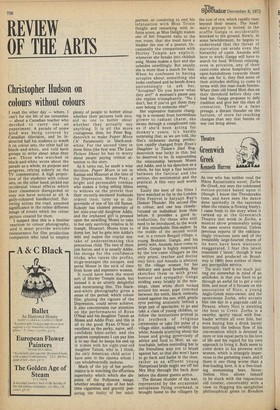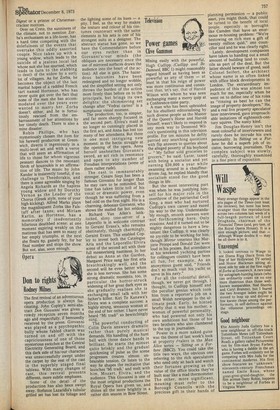Theatre
Greenwich Greek
Kenneth Hurren
As one who has neither read the Nikos Kazantzakis novel, Zorba the Greek, nor seen the celebrated motion-picture based upon it (though I know the Theodorakis tune, and have seen the dance done spiritedly in the tayernas when the retsina is flowing freely), I came fresh to the story when it turned up at the Greenwich Theatre last week in Zorba, a musical show presumably using the same source material. Unless previous reports of the exhilaratingly vivacious yarn and of the irresistibly large-hearted charm of its hero have been Wantonly exaggerated, I fear this latest treatment (' latest,' though it was written and produced on Broadway in 1968) does neither of them any perceptible service.
• The story itself is not much, putting me somewhat in mind of an artichoke, in that you have to go through an awful lot to get a very little, and most of it focuses on the association of Nico, a young Anglo-Greek mine-owner, and the eponymous Zorba, who accosts him one day in a puavside cafe in Piraeus, where Nico is awaiting the boat to Crete. Zorba is a swarthy, sporty rascal with freeloader written all over him, but even buying him a drink barely interrupts the tedious flow of his conversation which is devoted in more or less equal parts to his love of life and his regard for his own approach to living it. Both seem to come down to his prowess with women, which is strangely impervious to the gathering years, and if there is one thing worse than a free-loading bore, it is a free-loading womanising bore. Nevertheless Nico allows himself to be stuck with the loquacious old rooster, conceivably with a view to flogging his sprightlier philosophical gems to Readers Digest or a printer of Christmascracker mottoes.
Over on Crete, the sunniness of the climate, not to mention Zorba's enthusiasm as a life-lover, has a hard time competing with the dolefulness of the events that overtake this oddly assorted couple. Nico takes up with a young widow, which leads to the suicide of a jealous local lad whose suit she has spurned, which leads in turn to the stabbing to death of the widow by a surly lot of villagers. As for Zorba, he becomes the object of the last marital hopes of a raddled French tart named Hortense, who has never quite got over the fact that none of the men she has accommodated over the years ever wanted to marry her. Zorba doesn't either, and he is fortuitously rescued from the embarrassment of her attentions by her timely death. There is also a mine disaster.
Robin Phillips, who has mysteriously chosen the item for his farewell production at Greenwich, directs it ingeniously in a multi-level set and with a verve that will seem an affirmation of life to those for whom vigorous peasant dances to the resonant throb of bouzoukis is an affirmation of life. The music by John Kander is insistently tuneful, if no challenge to Theodorakis, and there is some agreeable singing by Angela Richards as the hapless young widow and by Dorothy Vernon as the Leader of the Chorus (Greek style, none of your high-kicking). Alfred Marks plays the magniloquent Zorba like Falstaff after taxes; and Miriam Karlin, as Hortense, has a memorably if inadvertently hilarious deathbed scene: at one moment expiring weakly on the mattress that has seen so many of her empty triumphs, at the next she floats np, gamely fey, for her final number and stops the show. But not, alas, soon enough.











































 Previous page
Previous page